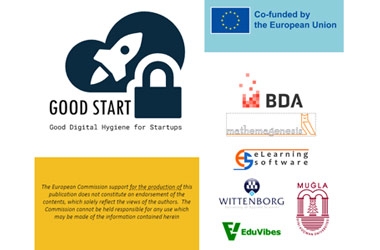Wittenborg Online News!
Good Start Project Produces Reports on Digital Hygiene Practices for Startups
Good Start Project Produces Reports on Digital Hygiene Practices for Startups
Good Start Project Produces Reports on Digital Hygiene Practices for Startups

Helping businesses to implement healthy digital hygiene strategy
The international project consortium of the Erasmus+ funded project Good Digital Hygiene for Startups (“Good Start”) project, of which Wittenborg is a project partner, recently produced the results of its first collaborative research in the form of various national and European level reports. The Good Start project is a collaboration with five other project partners from five countries: Turkey, Poland, Greece, Romania, and Latvia, with the overall aim of measuring and teaching startups, SMEs and other businesses and organisations about how to measure and develop skills in digital hygiene skills and practices.
The project consortium began working on the first project result - the creation of a Digital Hygiene Behaviour Index. The aim of this index is to measure the digital hygiene behaviour of startups and small businesses using a standardised approach. Over the past months, the Wittenborg Research Centre team alongside Wittenborg faculty members Adeyemi Banjo and Myra Qiu have been involved in researching and defining the current digital hygiene skills gap in the Netherlands. This involved researching the key drivers of digital transformation in the Netherlands, the Dutch government’s understanding of the digital skills landscape and its commitment to closing the digital skills gap, the level of awareness amongst businesses of digital hygiene, cybersecurity, digital transformation and implementation processes in the Netherlands and the regulations and procedures designed to improve digital hygiene practices of companies in the Netherlands.
The researchers from each project partner country conducted national surveys, involving 160 business owners, managers or employees of startups, VET providers, HEIs, industry leaders and professional organisations from the six project partner countries. The primary objective of the survey was to gather information about the current practice of managing digital hygiene and cybersecurity issues in their organisations, the previous experience with cybersecurity threats and respective solutions and the approach to managing respective digital skills from the project partner countries.
As a result of the research conducted and the survey results, a national report on the digital hygiene skills gap for each partner country was created. These national reports were then included in a combined EU-level report which provided a comparative analysis of the digital hygiene practices gap in the partner countries. An executive summary of the Digital Hygiene Practices and Skills Gap Current Situation Report is available HERE and a copy of the full report is available upon request. A visual presentation of the Good Digital Hygiene for Startups Survey Combined EU Report can be viewed HERE.
The consortium then worked on preparing the item pool for the creation of the Digital Hygiene Behaviour Index. Wittenborg led the item development for this project output. To prepare these items, an assessment of the digital hygiene gap was made, noting areas of commonality and divergence between the partner countries. This was followed by a literature review of current and innovative best practices in the realm of digital hygiene and cybersecurity, leading to an integration of the findings to create a comprehensive item list for the Digital Hygiene Behaviour Index.
The resulting item list was assessed and reviewed by a panel of experts from each partner country, then harmonised and collated into the first round of a pilot study and distributed amongst industry representatives and stakeholders. Once data from the first round of the pilot study is analysed for validity and reliability of the index, a second more in-depth round of pilot study will be conducted over the coming months before the final version of the index is formed and translated into the national languages of the project partner countries.
Find out more about the progress of the Good Start project and its upcoming activities via the official project website, or visit the project LinkedIn and Facebook pages!
WUP 14/7/2023
by Selina White
©WUAS Press
656 words